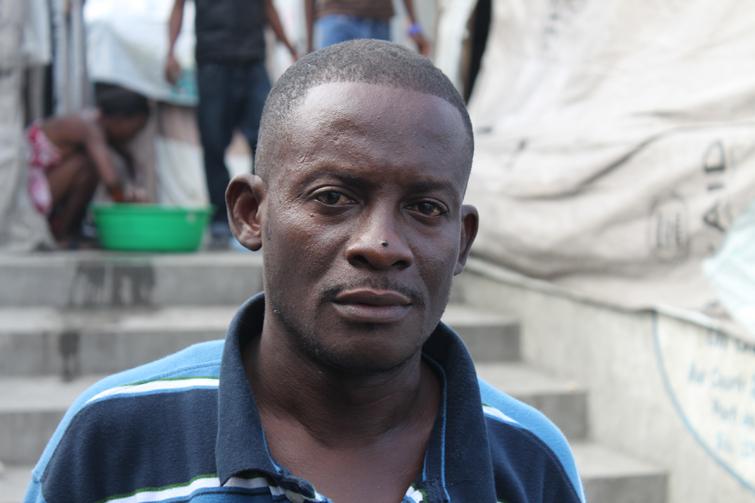Bridging Haiti’s class divide
Jean Wesner Guirand (photo: Jeb Sharp)
By Jeb Sharp
Class divisions are stark in Haiti. A tiny elite holds most of the country’s wealth and much of the rest of the population is desperately poor. People are divided by income, by language, even by skin color, and there’s fear and resentment all around.
Louis-Henry Mars thinks about these divisions a lot. He’s a former factory manager who comes from a long line of Haitian intellectuals. He says the outside world is focused on Haiti’s economy, but that’s not his priority.
“The front line issue for me is the issue of relationship between people and people, between the rich and the poor, between all sides of society, all sectors of society,” said Mars. “Until we actually focus on that first, nothing is really going to work here because that’s the real deep issue of the country.”
Mars traces the gap between the haves and have-nots to Haiti’s victorious slave rebellion more than 200 years ago. He says after independence in 1804, the elite who were closest to the colonial masters grabbed what they could of the country’s resources.
“But the foot soldiers, the peasants, those who actually were in the heat of the battle, did not get their fair share of the resources of the country and it’s that struggle that is still going on here today,” said Mars.
Talking to each other
And he doesn’t think it’s a struggle that will be ended by paving roads and building electricity grid. He thinks it’ll take people talking to one another, trusting one another, knowing one another.
For the past few years Mars has been working to bring rich business people together with gang leaders from the slums in a neighborhood called St. Martin. It was one of the places where political violence erupted when President Jean-Bertrand Aristide was forced from power in 2004. Businessman Yves Bourjolly’s building supply store was looted during the riots.
“It was terrible,” said Bourjolly. “There was nothing left. They stole everything. There was nothing left.”
Bourjolly joined the dialogues Mars helps facilitate through a project called the Partnership for Peace and Prosperity in St. Martin. We meet Bourjolly in his air-conditioned office. Armed guards stand watch outside. Bourjolly said he was afraid to meet slum leaders at first.
“I said to myself, those people probably don’t like me or they will be asking me for money all the time,” said Bourjolly. “I was really hesitant.”
But Bourjolly went ahead and joined the dialogues, which he found transformative. In retrospect, he doesn’t even blame the mobs who destroyed his store.
“I don’t think the people were responsible. I think we are all at fault,” said Bourjolly. “The whole society is at fault. The whole society who didn’t do anything for the people so they got angry at themselves, at everyone, because we didn’t do anything for them.”
Gangs
Mars takes me down the road to meet one of the gang leaders, Jean Wesner Guirand. Guirand says he knows gang leaders but he’s not one of them. These days he heads the neighborhood committee that helps run the camp where people have been sheltering since last year’s earthquake.
We sit down to talk in one of the tents. It’s sweltering. Guirand turns out to be less introspective than the businessman Bourjolly but he too says the dialogues have been eye opening.
“There was a tendency in the old days to think that the person who was bourgeois or who has money cannot be friends with someone who is poor,” said Guirand. “But it’s not true. There were differences of color, maybe of means, we were afraid of him, he was afraid of us, but when we sat down around a table it was all a myth. There was no need for us to fear each other.”
That sentiment resonated when the earthquake hit last year. About 25 people involved in the dialogue project were meeting in a courtyard. Louis-Henri Mars shows me the spot.
“If we were going to die, we were all going to die all together,” said Mars. “This building here kind of swerved towards us as we were standing in that yard there. And afterwards one of the guys told me, Louis, we were all going to die together. I said yes there was not going to be a difference whether I had a car or you were walking or whatever. We were all human beings. ”
Mars loved that moment of togetherness just after the earthquake. He knows dialogue alone won’t be a panacea for what ails Haiti. But he may well be right that all sorts of other interventions are doomed to fail unless and until Haiti’s rich and poor find reason to trust one another.
Our coverage reaches millions each week, but only a small fraction of listeners contribute to sustain our program. We still need 224 more people to donate $100 or $10/monthly to unlock our $67,000 match. Will you help us get there today?
